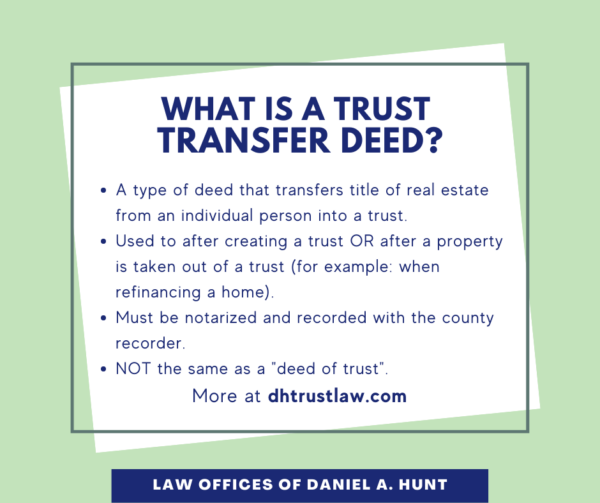What is a Trust Transfer Deed?

After creating a revocable living trust, the next step is transferring assets into the trust. If you’ve ever wondered how to transfer real estate into a trust, the way to do this is with a trust transfer deed. What is a trust transfer deed? Here’s an overview.
What is a trust transfer deed?
A deed is a legal instrument that transfers legal title of real estate, often from one person to another. A trust transfer deed is a type of deed that transfers title of real estate from an individual person into a trust.
Who needs a trust transfer deed?
There are two main scenarios when a person would need to use a trust transfer deed.
#1 When you create a trust: When you first create a trust, you’ll need to transfer your real property into the trust to avoid triggering a probate after you pass.
#2 If your home gets taken out of trust: Many refinance companies remove the title from a trust and put it back into your name as an individual in order to complete the refinance. If they fail to transfer it back into your trust, this could accidentally trigger a probate upon your death.
Always make sure that your real estate has been put back into your trust after a refinance. If it hasn’t, you should contact your estate planning attorney and request that they draft a new trust transfer deed for you.
How to create a trust transfer deed
When you initially create a revocable living trust, your estate planning attorney should draft a trust transfer deed for you. The deed will transfer title from you as an individual to you as trustee of your trust. Next, you’ll sign the deed in front of a notary public.
Preliminary Change of Ownership Report
In California, there is another key document that needs to be signed and filed with the county recorder along with your deed: a Preliminary Change of Ownership Report (or PCOR). Your attorney should prepare a PCOR when they draft your deed.
A PCOR notifies the county assessor’s office of the transfer and informs them that although a transfer is occurring, it is only between an individual and their trust. This lets the assessor know that even if the value of your property has increased, they do not need to reassess your property taxes.
Recording the deed
After you sign your deed, it must be recorded with the county recorder in the county where the property is located. How long does the recording process take? The time varies by county. In Sacramento county, it usually takes 4-6 weeks but in other California counties, it may take several months.
Once the deed has been recorded, the county recorder usually mails the original deed back to either the homeowner or the law firm that prepared the deed. If your attorney receives the original, they typically keep a copy in your estate planning file and forward the original to you. If you receive the original deed, be sure to send a copy to your attorney’s office to place in your estate planning file.
Trust Transfer Deed vs. Deed of Trust
We sometimes hear clients confuse a trust transfer deed with a deed of trust (aka trust deed). While these terms sound similar, they are totally unrelated. A deed of trust is a document sometimes used instead of a mortgage to transfer a property title to a third party such as a bank, escrow company, or title company until the borrower repays their debt to the lender. Be careful not to confuse these two similar terms.
If you have any questions about this topic or you need help drafting a deed, feel free to contact our law firm.
Law Offices of Daniel A. Hunt
The Law Offices of Daniel A. Hunt is a California law firm specializing in Estate Planning; Trust Administration & Litigation; Probate; and Conservatorships. We've helped over 10,000 clients find peace of mind. We serve clients throughout the greater Sacramento region and the state of California.




